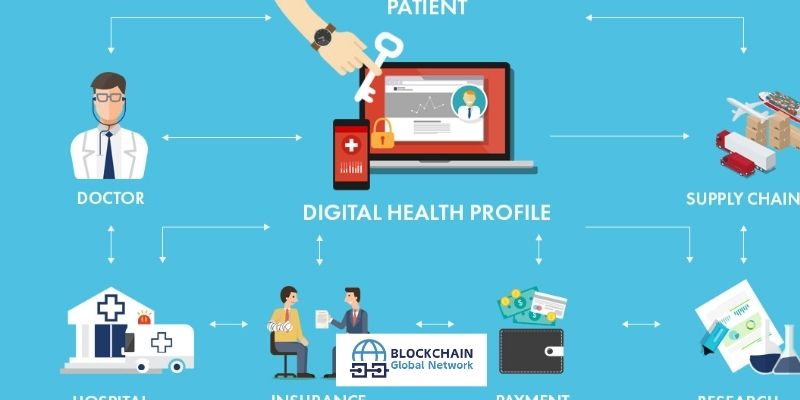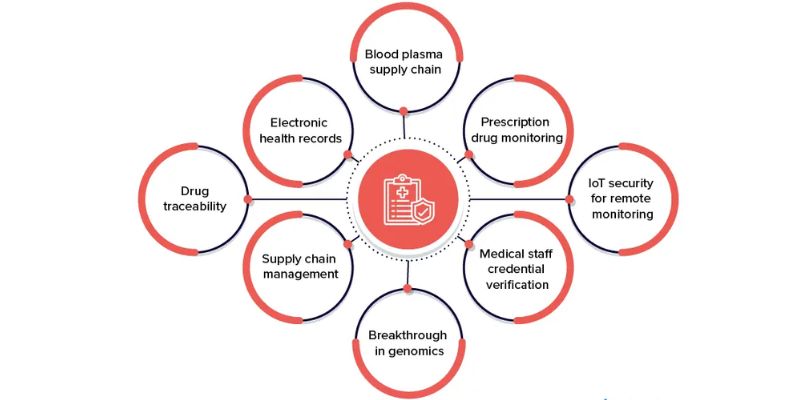The Challenges of Blockchain in Healthcare ignite a spirited debate: is this technology a game-changer or merely an obstacle? Promising secure records and system overhauls, blockchain faces significant hurdles. Join me as we uncover its real-world implications, exploring data security, patient privacy, and the complexities of healthcare delivery.
Navigating Data Security and Patient Privacy with Blockchain in Healthcare
Overcoming Data Security Concerns with Blockchain Implementation
Blockchain can make health data secure. This tech lets us share records safely. But it’s not easy to set up. Hospitals worry about hacks and leaks. They have to know the system well. It’s a big step to switch to blockchain. They need experts to help them do it right.
We want our health details kept safe. Blockchain can do this. Every record has its own lock, sort of. Only the right people have the key. It’s tough for hackers to get in. Still, some are scared to trust this new way. They don’t know it well. It’s my job to show them it’s safe.
It costs a lot to change systems. Tech can get old fast. We need to pick blockchain that can grow. It has to meet the rules set for health info too. There are laws to follow. It’s tricky, but with care, we can do it. We can keep your health data safe with blockchain.
Safeguarding Patient Privacy when Storing Patient Data on Blockchain
Patient data on blockchain must stay private. We use codes that hide who you are. Only certain people can see your info. This is good. But it’s new, and that can scare folks. Hospitals need to talk big about this. Say how safe it is. That way, folks might worry less.
When we put patient info on blockchain, we watch privacy rules. The law says data must stay private. This means we work hard to keep your health info secret. We don’t want anyone to peek. We try our best to shield it. It’s not simple, but it’s worth it to keep you safe.
Some worry about who can see their health info. With blockchain, we decide who gets a look. We can set up rules for each person. This means your doctor sees what she needs. Someone who pays bills might see less. We keep it tight so that no extra eyes get to peek.
Trust is key with medical records. Every time we touch patient data, we’re super careful. On the blockchain, each change gets its own mark. No one can mess with it without leaving a trace. It’s like your info has a bodyguard that never blinks.
Healthcare is important, and so is privacy. We work to match up blockchain with these needs. We train folks in hospitals. We make sure they know what to do. We aim for a future where you feel safe about your health records. Blockchain has big steps to take, but it offers us a path to better, safer care.
The Intersection of Blockchain Technology and Healthcare Regulations
Addressing Healthcare Blockchain Regulatory Challenges
We know blockchain can shake up healthcare. But boy, it’s not simple. Every day, folks like me hit walls making blockchain work for health. These walls are big, real big, made of rules that keep patients safe. We call them healthcare blockchain regulatory challenges. Job number one is to keep personal health info locked tight. This means blockchain must meet laws like HIPAA in the US. It has to keep secrets just as well, or better, than the old systems.
We’ve got smart people working hard at this. They look at laws and figure out how blockchain can fit. They ask, “How do we keep data safe on this new path?” The goal is a green light for blockchain, making sure it’s all good with the rules. They have to think about who can peek at patient data. They must lock out the ones who shouldn’t. And let’s not forget, doctors and nurses need to get info fast for patient care.
Ensuring Compliance with Smart Contracts and Electronic Health Records
Now, let’s chat about smart contracts. These are like pinky promises in the digital world. When certain things happen, they automatically do their job. For instance, they can help manage patient consent. This is huge. They make sure only the right eyes see a patient’s health story. But again, these smart contracts must play nice with the law. They need to check all boxes for compliance.
Then we have electronic health records, or EHRs. They’re everywhere in healthcare. When we bring blockchain into the picture, it’s a big shift. Blockchain could help EHRs talk to each other better. But wait, there’s a catch. This tech must work smoothly with all shapes and sizes of EHR systems. And remember, this is personal stuff we’re talking about. So, patient privacy is a big deal. It’s like making sure no one reads your diary.
Moving patient records to blockchain can help keep them from prying eyes and sticky fingers. Plus, it’s like having a super memory for records. They can’t be changed, which is awesome for keeping things straight. But we’ve got to make sure the way they’re handled is top-notch right. It’s not just about being cool and high-tech. It’s about meeting the mark for trust and safety in healthcare.
What we are doing here is no small task. As an expert in blockchain in healthcare, I’m always looking at the tiny details. I see the tech side, the health side, and the rulebook. My role is to help them work together. Joining rules and tech takes time and smarts. But when we do it right, we can help doctors and patients alike. It keeps info safe, but still lets the good guys in. It’s a tough gig, but worth every grey hair. Because in the end, if we nail it, we make healthcare better for everyone.
Tackling Interoperability and Scalability in Healthcare Blockchain
Breaking Down Interoperability Barriers in Healthcare Blockchain Systems
We know hospitals have many different systems. They must work well together. But often, they don’t. Enter blockchain. This tech can link up these systems in a smart way. But it’s not easy. Let me explain why.
First, we face interoperability barriers. Each hospital system is like a person speaking a different language. Blockchain is like a translator. But for it to work, we need everyone speaking the same basic language. Only then can patient data move smoothly across different systems.
Now, we want patients’ health info to be safe and private, right? Well, blockchain can give us that. It makes sure only those who should see a patient’s health info, do. But getting there takes work. We must teach systems to talk to each other. And do it without risking private info.
So, we see “interoperability barriers in healthcare blockchain.” These are like tall walls. They block the path. They make it hard to move patient info where it belongs. And with blockchain, we aim to tear these walls down.
Managing Blockchain Scalability Issues in Medical Settings
Next up, let’s chat about blockchain’s size and speed. Or as the tech folks call it, scalability. Why does this matter? Simple. Think of a small road. A few cars travel just fine. But what if hundreds want to pass at once? You get a traffic jam. Scalability issues in blockchain are like this jam. But instead of cars, it’s loads of data that get stuck.
Healthcare produces huge amounts of data. It grows every second. A perfect blockchain must handle this without slowing down. It needs to stay quick and responsive, even when lots of users hop on at once.
Imagine having a quick chat with your doc. You’d be unhappy if you had to wait for hours, right? Same with accessing medical records on blockchain. We don’t want that to happen. So, we must make sure blockchain can grow. It should handle more data without fuss. This is key to keeping things running fast.
But remember, making blockchain bigger isn’t a snap. It’s not just flipping a switch. It needs planning, big servers, and smart tech folks. It means looking ahead. We must build it strong from the start. So it doesn’t stumble as it grows.
I’ll tell you for sure, these challenges are real tough nuts to crack. But we’re on it. With each step, we aim to make healthcare better. Safer. Faster. All with the help of blockchain. The road ahead has bumps, yeah. But I believe we’ll make it. We’ll break those barriers. We’ll beef up the systems. And one day, we’ll look back and say, “We did it!” And that, my friends, will be a huge win for us all.
Economic and Operational Impacts of Integrating Blockchain in Healthcare
Analyzing Cost Implications and Blockchain Complexity in Clinical Environments
When we think about adding blockchain to healthcare, we hit a big question. How much will it cost? Costs can soar. We need computers, programs, and smart folks to run it all. And it’s not just about money. We must train healthcare staff, which takes time.
Blockchain stuff can get tricky. Many worry about patient privacy. They ask, “Will my secrets stay safe?” Yes, blockchain keeps data safe, but it must be set up right. We need strong rules to shield our health talks and keep our care top-notch.
Sometimes, doctors and nurses find blockchain odd and hard. We must help them get it. They need to know why it’s cool, and how it helps. Like, it can trace where your medicine comes from. That’s power in their hands.
Overcoming Blockchain Adoption Hurdles in Hospitals and Clinical Practice
Now, let’s tackle a tough bit: making blockchain a part of daily hospital life. We face walls that slow us down. Many in healthcare don’t like change. They fear new tech might mess up the flow or drop the ball on patient care.
But hold on – blockchain is a star at keeping data right and safe. Think about it. When we see a doc, many things happen. We have chats, tests, and get meds. All this info can live on a blockchain. It means less mix-ups. It helps doctors stay sharp.
Yet, we have bridges to build. Computers in hospitals speak different tech languages. They must all get along to make blockchain shine. We work hard to make this happen. The goal? A smooth path for patient info to glide safely along.
Training is key. Nurses and docs should feel cool with the tech. We need to show them straight up how it works. And rights are a big deal. Patients should know their data is safe and say who sees it.
In all this, we stick to the law. We make sure blockchain follows rules that keep folks safe. Healthcare is no game. Lives are on the line. So, we tread with care and keep folks in the loop.
We’re on a journey, friends. Blockchain can change healthcare, big time. Costs, brain teasers, and new ways – they’re all part of the gig. But we’re moving forward. Making health better for us all is worth every step.
We’ve explored how blockchain can secure healthcare data and enhance patient privacy, while also simplifying record access for doctors. Despite the costs and challenges of implementation, blockchain has the potential to transform hospital operations. If we continue to advance this technology, it can lead to significant improvements in healthcare for everyone.
Join us at Blockchain Global Network to be part of this exciting transformation!
Q&A
What Are the Major Barriers to Blockchain Adoption in Healthcare?
While blockchain offers significant benefits to the healthcare sector, it faces numerous challenges that hinder its widespread adoption. These include interoperability complexities between the myriad of healthcare systems, the need for compliance with stringent regulations such as HIPAA, concerns over the scalability of blockchain solutions, and apprehension about the security and privacy of sensitive patient data.
How Does Blockchain Technology Affect Data Privacy in Healthcare?
Blockchain has the potential to revolutionize data privacy in healthcare by providing a secure, immutable ledger for storing patient information. However, this also brings challenges. Ensuring that this technology conforms to data protection laws, and determining who has access to the data and how consent is managed are pressing concerns that healthcare providers must navigate when implementing blockchain solutions.
Can Blockchain Solve Interoperability Issues in Healthcare Systems?
Blockchain technology promises to enhance interoperability by creating a unified platform for health data exchange. Nonetheless, achieving this requires overcoming significant obstacles, including the integration with existing healthcare IT systems, establishing common standards, and ensuring that all stakeholders, including small healthcare providers, can participate in the blockchain network without prohibitive costs.
What Are the Scalability Concerns with Blockchain in Healthcare?
As healthcare data exponentially grows, blockchain networks must be able to scale accordingly. However, existing blockchain frameworks often struggle with transaction speed and volume, which can result in bottlenecks and increased operational costs. Developing scalable blockchain solutions that can handle the vast data throughput required by the healthcare industry remains a critical challenge.
How Does the Complexity of Regulatory Compliance Affect Blockchain in Healthcare?
The healthcare industry is heavily regulated, and incorporating blockchain must be done in compliance with all legal frameworks. Navigating the complexities of regulations like HIPAA in the US, GDPR in Europe, and other national health data regulations is a challenge for blockchain implementation. Blockchain applications must be carefully designed to meet these regulatory compliance demands while still delivering on their promises of efficiency and security.






RELATED POSTS
Methods to Prevent Blockchain Attacks: Safeguard Your Digital Fort Knox
Prevent blockchain attacks with fortified...
Democratizing Education: How Decentralized Platforms Open Doors for All
Democratizing access to education with...
What is rate limit exceeded on twitter?
What is rate limit exceeded...
Replay Attacks on Blockchain: Protecting Your Digital Assets
Protect your digital assets from...
Blockchain in Government: Revolutionizing Public Sector Transparency and Efficiency
Enhance trust in government with...
Exploring The Different Types Of Consensus Mechanisms In Blockchain
Explore the Landscape of Blockchain...
Security of Hash Functions: Cracking the Code on Digital Safety
Enhance Data Integrity with Advanced...
Market Maker Magic: How Crypto Liquidity is Shaped
"Discover the Vital Role of...
Ethereum Launch Unveiled: What’s New in the World of Crypto?
Discover the Launch of Ethereum...
What are distributed systems? Bridging the Gap Between Efficiency and Complexity
In today’s digital age, the...
Challenges of Blockchain Technology: Navigating the Digital Minefield
Struggling with blockchain scalability and...
Cost of Blockchain Security Audits: Are You Investing Wisely?
Understanding the Costs of Blockchain...
Gradient Network Airdrop – How to Earn Points and Receive Rewards
Are you ready to dive...
Predictions about the Future of Blockchain Security: Revolutionary Safeguards Ahead
Predictions about the future of...
Forgotten Runiverse: A promising NFT Game on Ronin Network
Forgotten Runiverse is emerging as...
What Are Crypto Derivatives? Mystery of Digital Trading Instruments
Demystifying Crypto Derivatives: Understanding Basics,...